Mobilizing Insights in Defence and Security (MINDS) – Annual report 2023-2024
Message from the Assistant Deputy Minister (Policy)
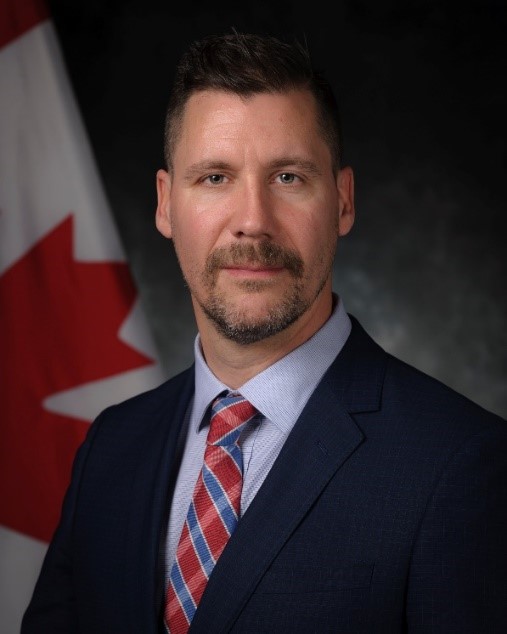
I am pleased to present the 2023-24 Mobilizing Insights in Defence and Security (MINDS) Annual Report. The fifth year of the MINDS program was marked by increasing geopolitical tensions and threats to the rules-based international order as demonstrated by Russia's ongoing unprovoked, full-scale invasion of Ukraine, China's growing militarization of its maritime domain, and a recent escalation of tensions in the Middle East. Here at home, Canada experienced the worst wildfire season on record, with our Armed Forces being called on at an unprecedented rate to support and control the spread. We have also seen increasing incursions by foreign nations into our Arctic waters, highlighting the importance of securing our northern borders. These events demonstrate that now more than ever, the MINDS program remains an important asset to contributing key analysis from the expert community to help inform decision making on critical defence and security issues.
Over the past year, the MINDS program has continued to demonstrate its positive impact on policymaking. The program has established strong connections with a diverse expert community and in 2023-24 MINDS received the highest number of applications ever for its Targeted Engagement Grant (TEG) program. MINDS continues to facilitate meaningful dialogue between the Defence Team and the defence and security expert community.
In the year ahead, I am confident that MINDS will continue to deliver valuable insights on new and emerging challenges, and to continue expanding its delivery of policy-relevant expertise to meaningfully support the work of the Defence Team.
Peter Hammerschmidt
Assistant Deputy Minister (Policy)
Department of National Defence
Executive Summary
In its fifth year of operations, the MINDS program responded to the evolving threat landscape by generating valuable insights on the most pressing challenges faced by the Defence Team. The program maintained its commitment to meaningful knowledge exchange by selecting three new Collaborative Networks and awarding grants and scholarships for research projects. MINDS also hosted several virtual events with experts through the Expert Briefing Series mechanism, which helped to facilitate useful discussions between the expert community and the Defence Team. In 2023-24, MINDS continued to be a responsive and relevant enabler of defence and security expertise.
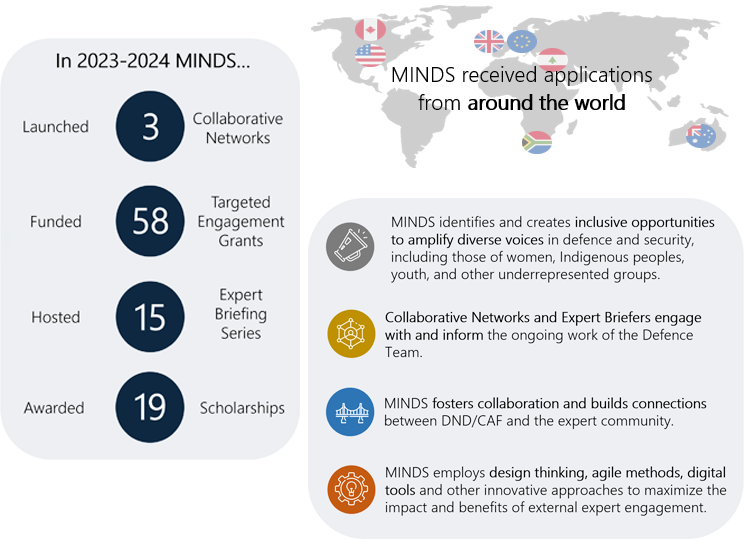
Caption
In 2022-2023 MINDS…
- Launched 3 Collaborative Networks
- Funded 62 Targeted Engagement Grants
- Hosted 22 Expert Briefing Series
- Awarded 26 Scholarships
- Initiated 1 Rapid Response Challenge
MINDS received applications from around the world
- MINDS identifies and creates inclusive opportunities to amplify diverse voices in defence and security, including those of women, Indigenous peoples, youth, and other underrepresented groups.
- Collaborative Networks and Expert Briefers engage with and inform the ongoing work of the Defence Team.
- MINDS fosters collaboration and builds connections between DND/CAF and the expert community.
- MINDS employs design thinking, agile methods, digital tools and other innovative approaches to maximize the impact and benefits of external expert engagement.
The MINDS Program
MINDS is founded on the idea that policy- and decision-making are strengthened when assumptions are challenged and diverse viewpoints are considered. MINDS provides opportunities for collaboration between the Defence Team and the defence and security expert community through a program that:
- responds to the needs for relevant and timely advice from defence and security experts;
- fosters the next generation of experts and scholars; and,
- contributes to Canadians' understanding of defence and security issues.
MINDS Pillars
MINDS offers a variety of unique tools, or pillars, by which the Defence Team can engage with external experts to access high caliber, relevant and timely research and expertise, which incorporates a diversity of viewpoints and provides well-rounded advice. The MINDS tools include:
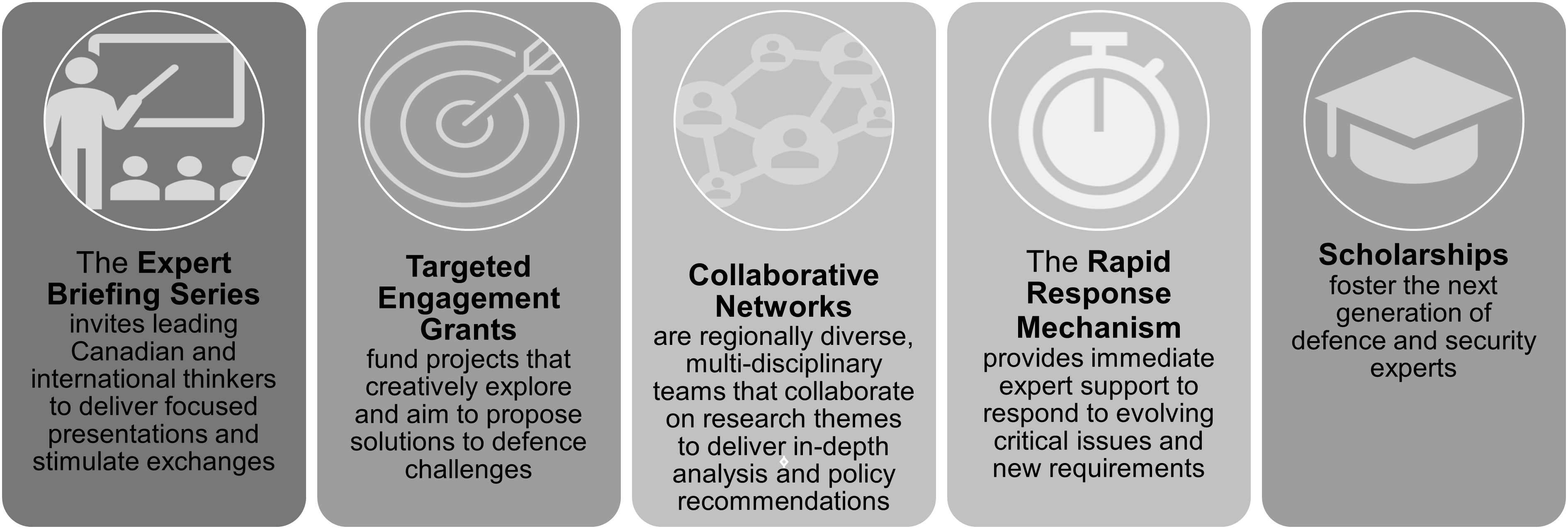
Caption
The Expert Briefing Series
Invites Leading Canadian and international thinkers to deliver focused presentations and stimulate exchanges
Targeted Engagement Grants
Fund projects that creatively explore and aim to propose solutions to defence challenges
Collaborative Networks
Regionally diverse, multi-disciplinary teams that collaborate on research themes to deliver in-depth analysis and policy recommendations
The Rapid Response Mechanism
Provides immediate expert support to respond to evolving critical issues and new requirements
Scholarships
Foster the next generation of defence and security experts
Year in Review
In 2023-2024, the MINDS program continued to provide valuable insight to policy makers engaged in difficult challenges facing the Department, from the growing threat from adversarial nationals in the global security landscape, the increasing importance of NORAD and securing our northern borders, to addressing the impacts of climate change here at home. In its fifth year, MINDS has maintained its importance as a responsive and forward-looking driver of key defence and security insights to support the work of the Department and its policymakers.
Responding to the Evolving Security Environment
As the global security environment continued to evolve, MINDS remained a flexible mechanism to provide relevant and timely advice in a rapidly changing context. The program continued to be responsive to on-going security concerns such as Russia's continued invasion in Ukraine and the increasing threat that China posed to the international rules-based order.
In 2023-2024, MINDS continued to fund research that explores the changing nature of the security environment, with nearly half of all funded Targeted Engagement Grants addressing the 'Strategic Competition and Global Issues' Challenge.
Preparing for the Future of Defence and Security
The rapid evolution of emerging technologies is a key factor of the changing security environment: one that presents opportunities and vulnerabilities. Outside of cyber and space, which have already become key operational domains, other technological advances, such as artificial intelligence (AI) and quantum, have the potential to change the nature of military operations and activities. To support the Department’s ability to anticipate, adapt, and act in this environment, MINDS funded two Collaborative Networks working in these domains – the Space Security Network and the Triple Helix Network.
Evolving Culture within the Defence Team
Building a Defence Team culture where all members feel safe and respected remained a top priority for Department of National Defence (DND)/ Canadian Armed Forces (CAF) in 2023-24. Significant efforts have been deployed to achieve a meaningful and sustainable evolution of Defence Team culture. To support the Department's commitment to implementing the recommendations of the Independent External Comprehensive Review by Justice Louise Arbour, MINDS hosted 3 Expert Briefing Events related to Culture Change. Two MINDS-funded Collaborative Networks also continued their work in this space, the Transforming Military Cultures Network (TMC-Net) and the Research Network on Military Sexual Trauma (MST), which fostered dialogue and collaboration between policymakers and external experts related to culture change.
A – MINDS Policy Challenges
The MINDS Policy Challenges articulate key strategic policy issues facing the Defence Team and represent areas for knowledge transfer and collaboration with the defence and security expert community. The challenges are co-developed with key stakeholders from across DND/CAF and tie the various program elements together to ensure that funding decisions are aligned with National Defence and broader Government of Canada priorities. Applicants for all MINDS funding programs must demonstrate how their research proposals will address at least one of these Challenges.
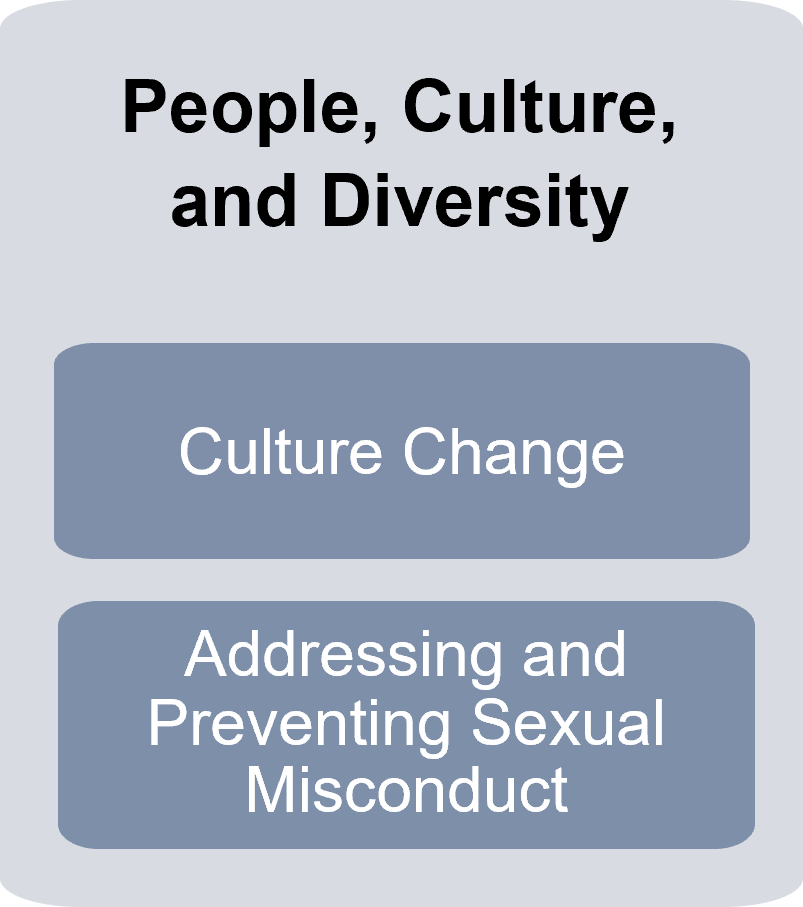
Caption
Two boxes listing the Policy Challenges under People, Culture, and Diversity:
- Culture Change
- Addressing and Preventing Sexual Misconduct
People, Culture, and Diversity
Creating and maintaining a safe and inclusive workplace is a fundamental mission and one of the top priorities for DND/CAF. This includes a sustained commitment to ensuring a respectful workplace, free from harassment and discrimination. Sexual misconduct is a serious and persistent problem that harms military and civilian personnel, and previous initiatives in DND/CAF have not achieved their desired effects. Addressing this challenge requires a significant and sustained long-term effort with a deliberate plan for systemic change across the institution.
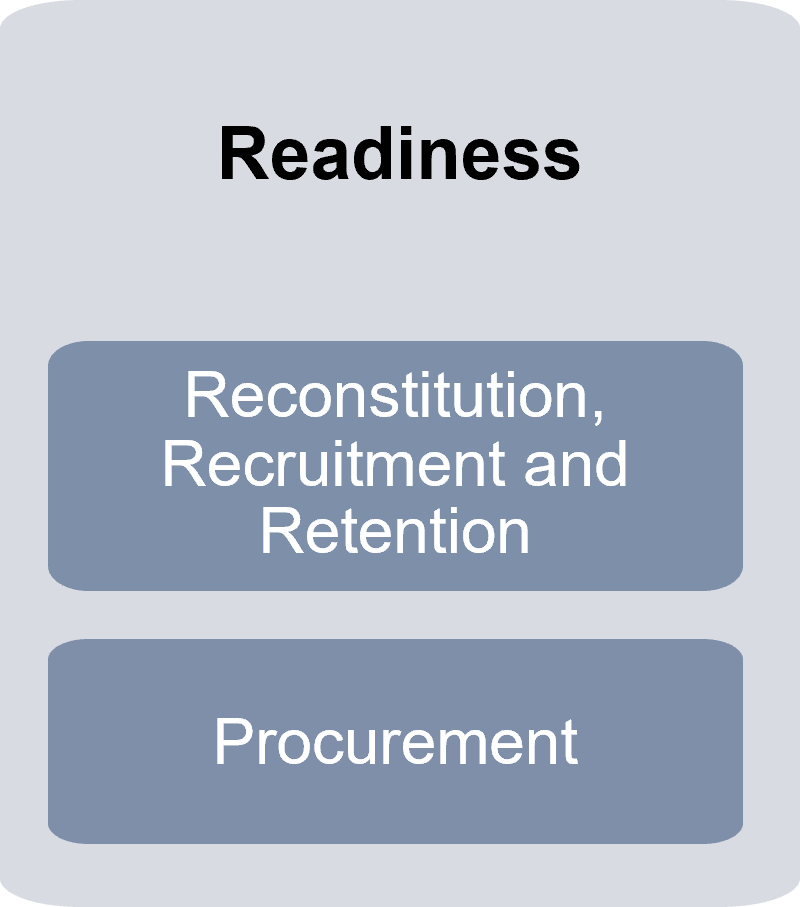
Caption
Two boxes listing the Policy Challenges under Readiness:
- Reconstitution, Recruitment and Retention
- Procurement
Readiness
It is important that the CAF can attract, recruit, develop and retain top talent. The CAF has released a Reconstitution Plan to rebuild strength, maintain readiness, and continue to modernize now and for the future. The Defence Team also needs to be ready to respond to a rapidly changing security environment, while contending with increasing domestic pressures to support health and climate-related emergencies. Appropriate procurement is critical for the timely delivery and evolution of the modern capabilities required to ensure the Canadian Armed Forces are ready and suitably equipped.
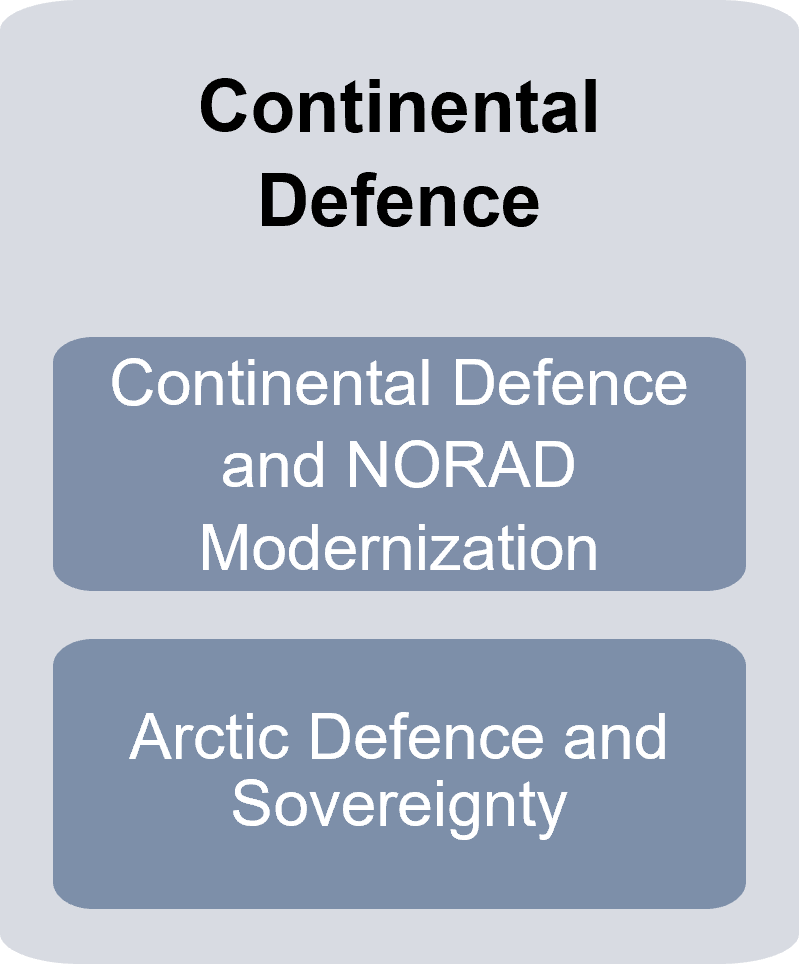
Caption
Two boxes listing the Policy Challenges under Continental Defence:
- Continental Defence and NORAD Modernization
- Arctic Defence and Sovereignty
Continental Defence
Investing in continental defence and modernizing the North American Aerospace Defense Command (NORAD) has become more urgent. The DND/CAF must continue to develop and enhance its approach to defending Canada and North America, nationally and in collaboration with the US. The Arctic is also increasingly becoming more strategically important as climate change, economic interests, and geopolitical competition drive growing interest and activity in the region. In this context, DND and CAF need to be prepared to conduct and sustain a vast array of operations, from demonstrating Canadian sovereignty, to search and rescue and emergency management.
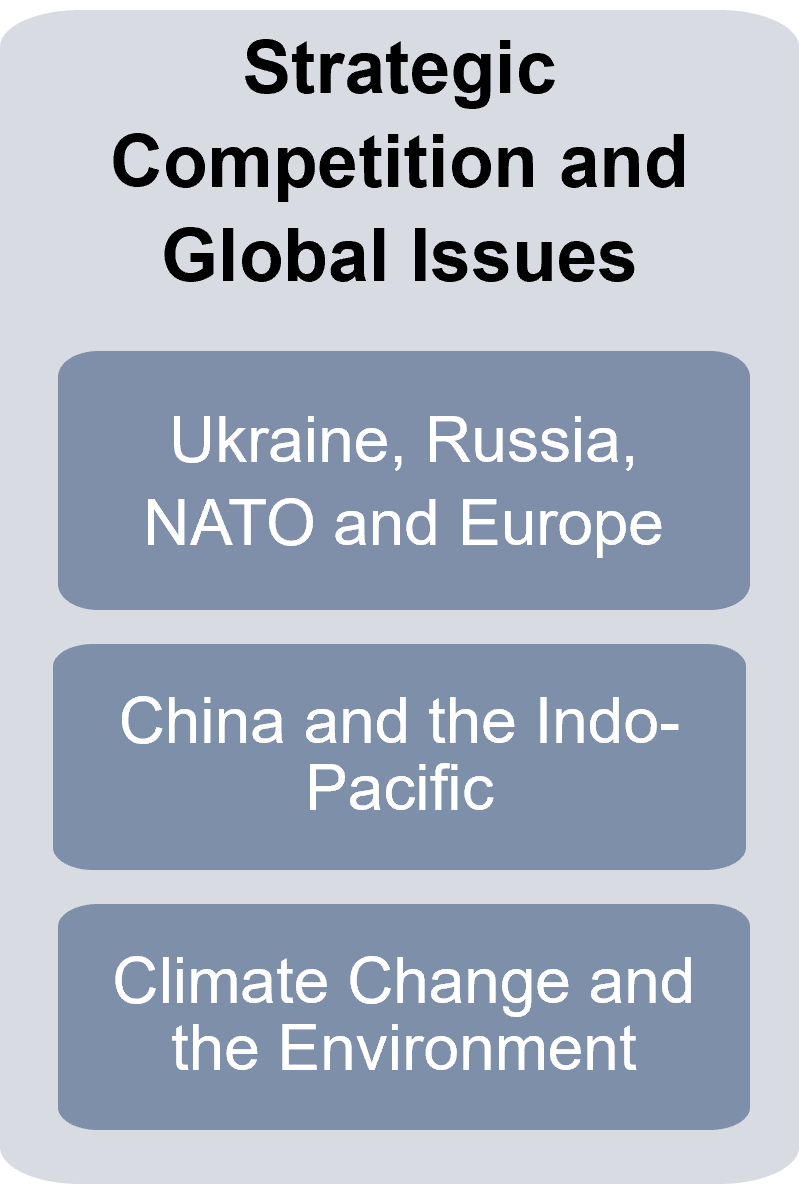
Caption
Three boxes listing the Policy Challenges under Strategic Competition and Global Issues:
- Ukraine, Russia, NATO and Europe
- China and the Indo-Pacific
- Climate Change and the Environment
Strategic Competition and Global Issues
The resurgence of strategic competition between major powers has already started a shift in how the global security environment is perceived and has highlighted concepts that had subsided since the end of the Cold War, such as the risk of state-on-state conventional war, and the need for deterrence. Russia's invasion of Ukraine greatly accelerated and even cemented that shift. Canada also announced its Indo-Pacific Strategy in 2022 with the aim to deepen Canada's engagement in the region, including investments in defence to increase our forward naval presence, participation in multilateral regional exercises, and military-to-military capacity building programming, including in Women, Peace and Security. China's rise as a global actor, its aggressive and sometimes coercive pursuit of national interests, and overall challenge to the rules-based international order, have also had significant and far-reaching implications. Lastly, climate change is a complex security challenge that requires complex responses, while still concurrently supporting the full spectrum of more traditional military operations domestically and overseas.
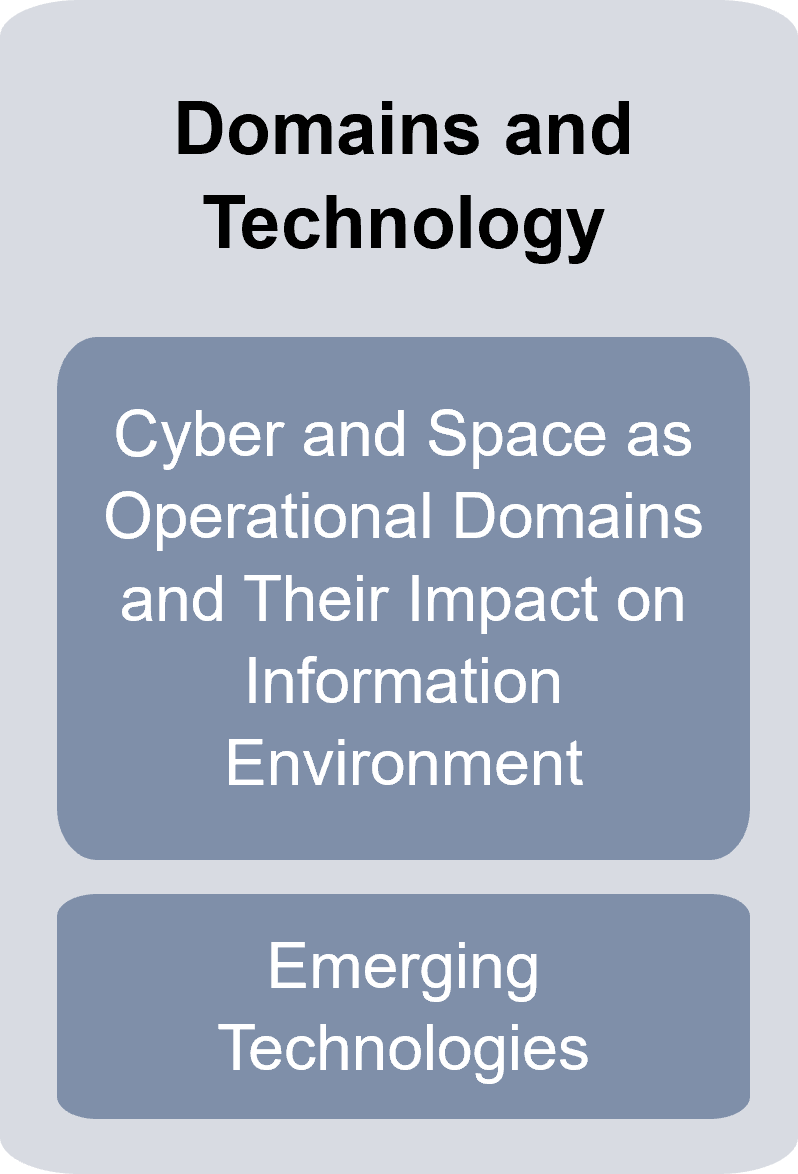
Caption
Two boxes listing the Policy Challenges under Domains and Technology:
- Cyber and Space as Operational Domains and Their Impact on Information Environment
- Emerging Technologies
Domains and Technology
In an increasingly complex, opaque, and volatile security environment, adversaries are competing across multiple domains concurrently. Leveraging cyber and space, to gain an advantage in the information environment is crucial to modern military operations. DND/CAF must be resourced to anticipate, adapt, and act to contribute alongside government and other partners to secure Canadian defence, security and broader interests against pan-domain challenges. The rapid evolution of emerging technologies is a key factor of the changing security environment: one that presents opportunities and vulnerabilities. Outside of cyber and space, which have already become key operational domains, other technological advances, such as artificial intelligence and quantum, have the potential to change the nature of military operations and activities.
B – Expert Briefing Series
Through the Expert Briefing Series (EBS) mechanism, top Canadian and international defence and security experts are invited to brief the Defence Team and Government of Canada officials on priority issues. Through virtual webinars and roundtables discussions, defence and security practitioners engage in rich conversations with leading experts and diverse thinkers.
Highlights
In 2023-24, MINDS collaborated with stakeholders across the Defence Team to host 15 expert briefings and roundtable engagements on of a range of complex challenges. A list of all engagements is included in Annex A. The most frequent Policy Challenge addressed in the expert briefing events in 2023-24 was the 'Strategic Competition and Global Issues' Challenge, with the following global areas being addressed:
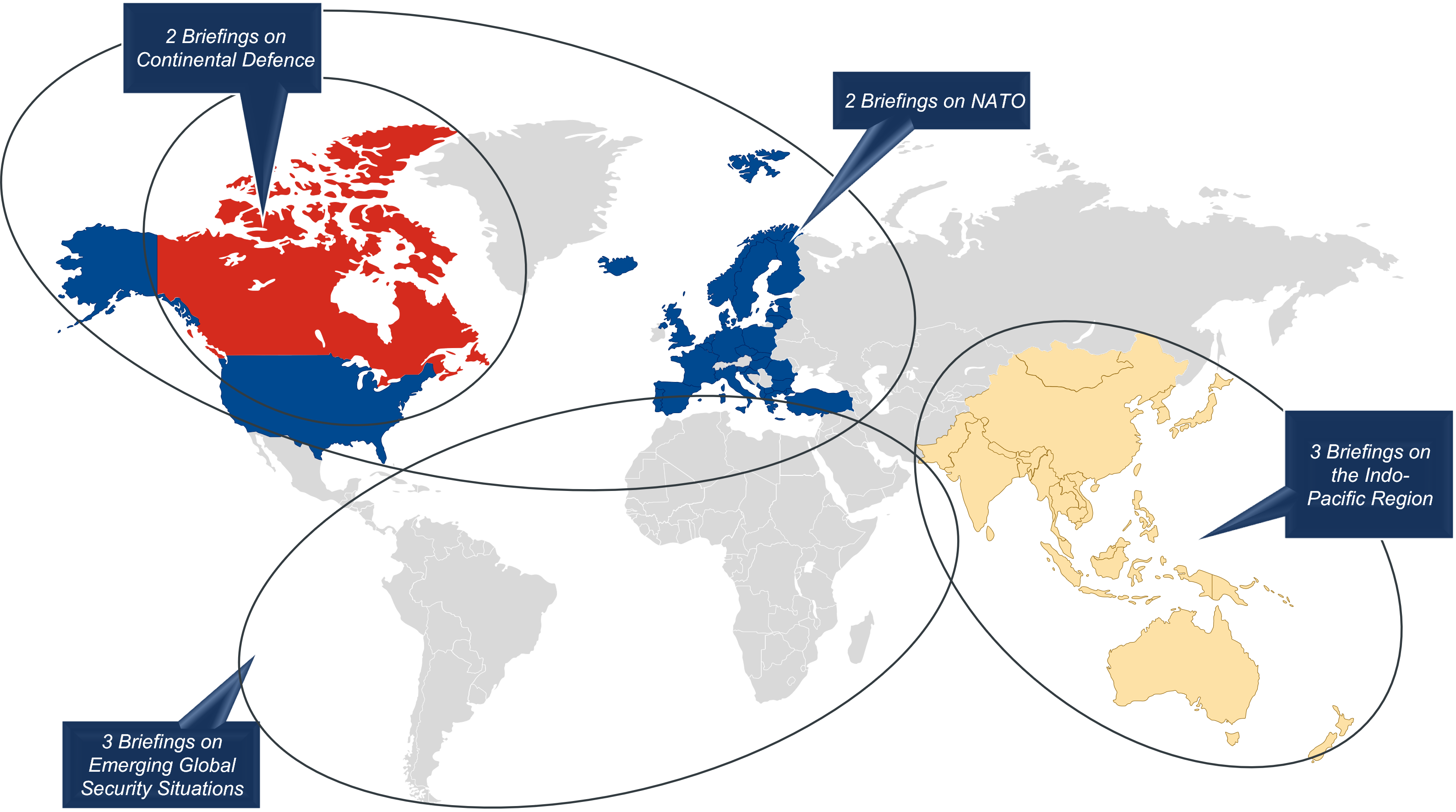
Caption
A map of the world with four regions circled and/or highlighted to show the themes of MINDS briefings.
- Canada highlighted in red with a text bubble pointing to it stating, "2 Briefings on Continental Defence".
- NATO member states highlighted in blue with a text bubble pointing to them stating, "2 Briefings on NATO".
- The Indo-Pacific region highlighted in yellow with a text bubble pointing to it stating, "3 Briefings on the Indo-Pacific Region".
- South America and Africa – circled but not highlighted, with a text bubble pointing to it stating, "3 Briefings on Emerging Global Security Situations".
C – Targeted Engagement Grants
The projects that MINDS funds help to drive innovation, amplify expert and diverse voices, spark wider discussions, and inform policy discussions on important and timely defence and security issues. Targeted Engagement Grants (TEGs) provide up to $50,000 in non-recurring financial support for projects such as conferences, roundtables, workshops, research, and publications. To continue to foster the next generation of experts, grants valued at $10,000 are also available under the Young MINDS Initiative for undergraduate and Master's students.
2023-24 Funding Results
The full overview of all funded projects can be found at: Funding Results - Canada.ca

Caption
An information box showcasing the following statistics:
- 138 applied
- $6,2 millions requested
- 131 Grants
- 7 Young MINDS
- 58 funded
- $2.6 million disbursed
- 55 Grants
- 3 Young MINDS
Highlights
In 2023-24, MINDS received Targeted Engagement Grant applications from around the world and across Canada. The second competition of the year received the highest number of applications ever received for a TEG competition.
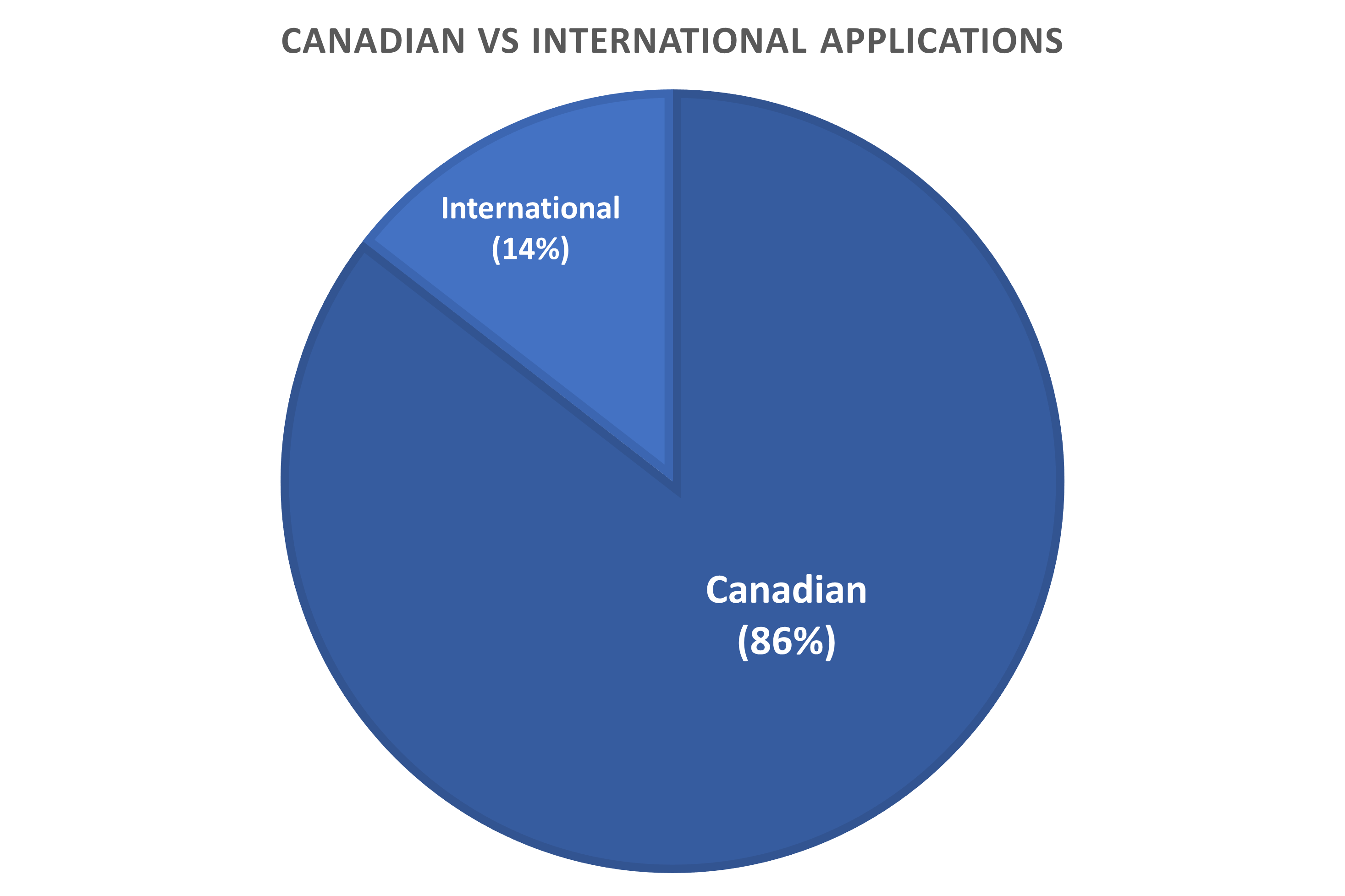
Caption
A pie chart showing Canadian applications (86%) vs international applications (14%).
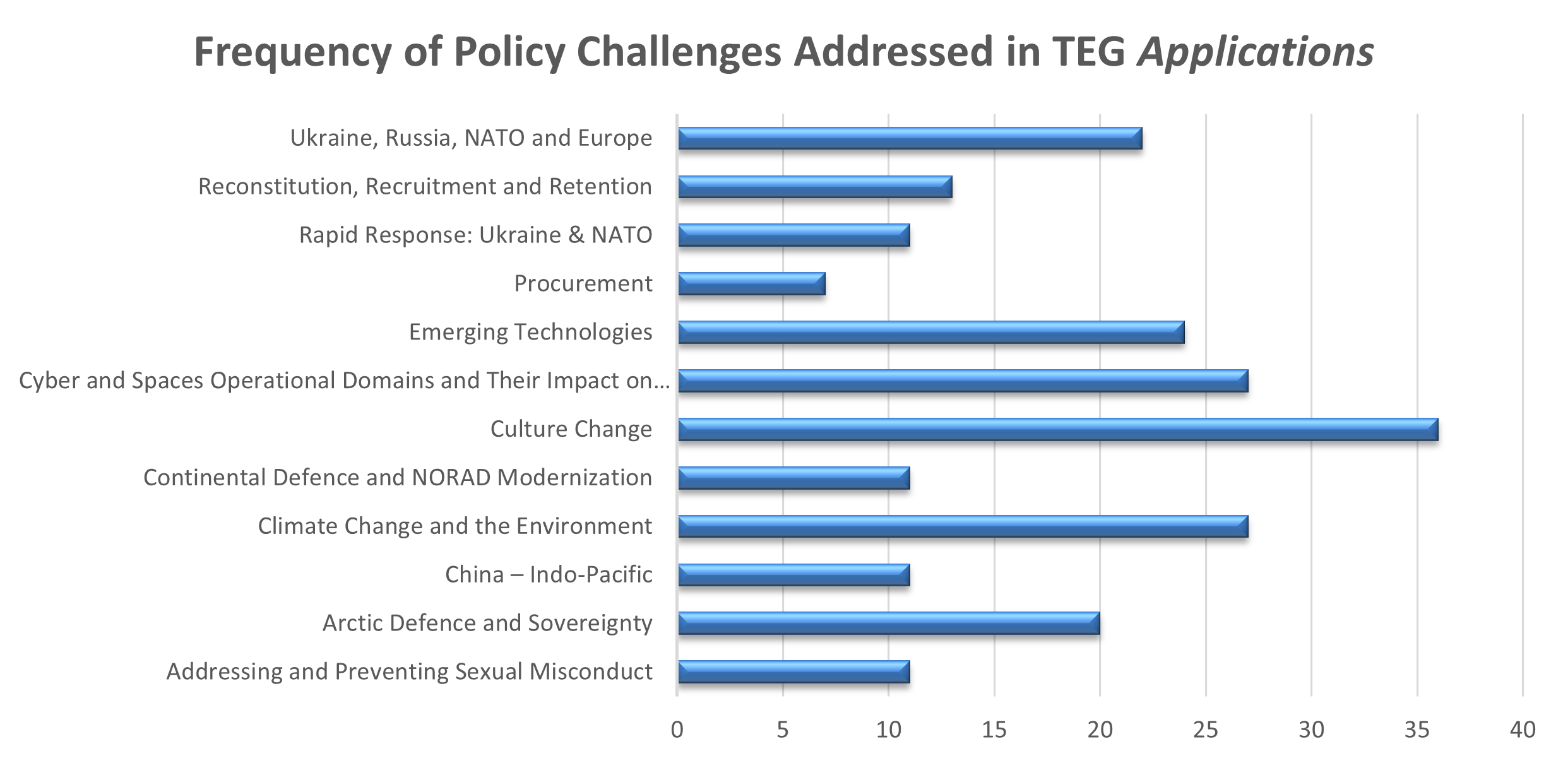
Note: Each Targeted Engagement Grant application can list up to 3 Policy Challenges
Caption
The first bar chart indicates the frequency of policy challenges addressed in TEG applications:
- Ukraine, Russia, NATO and Europe: 22
- Reconstitution, Recruitment and Retention: 13
- Rapid Response: Ukraine & NATO: 11
- Procurement: 7
- Emerging Technologies: 24
- Cyber and Spaces Operational Domains and Their Impact on Information Environment: 27
- Culture Change: 36
- Continental Defence and NORAD Modernization: 11
- Climate Change and the Environment: 27
- China – Indo-Pacific: 11
- Arctic Defence and Sovereignty: 20
- Addressing and Preventing Sexual Misconduct: 11
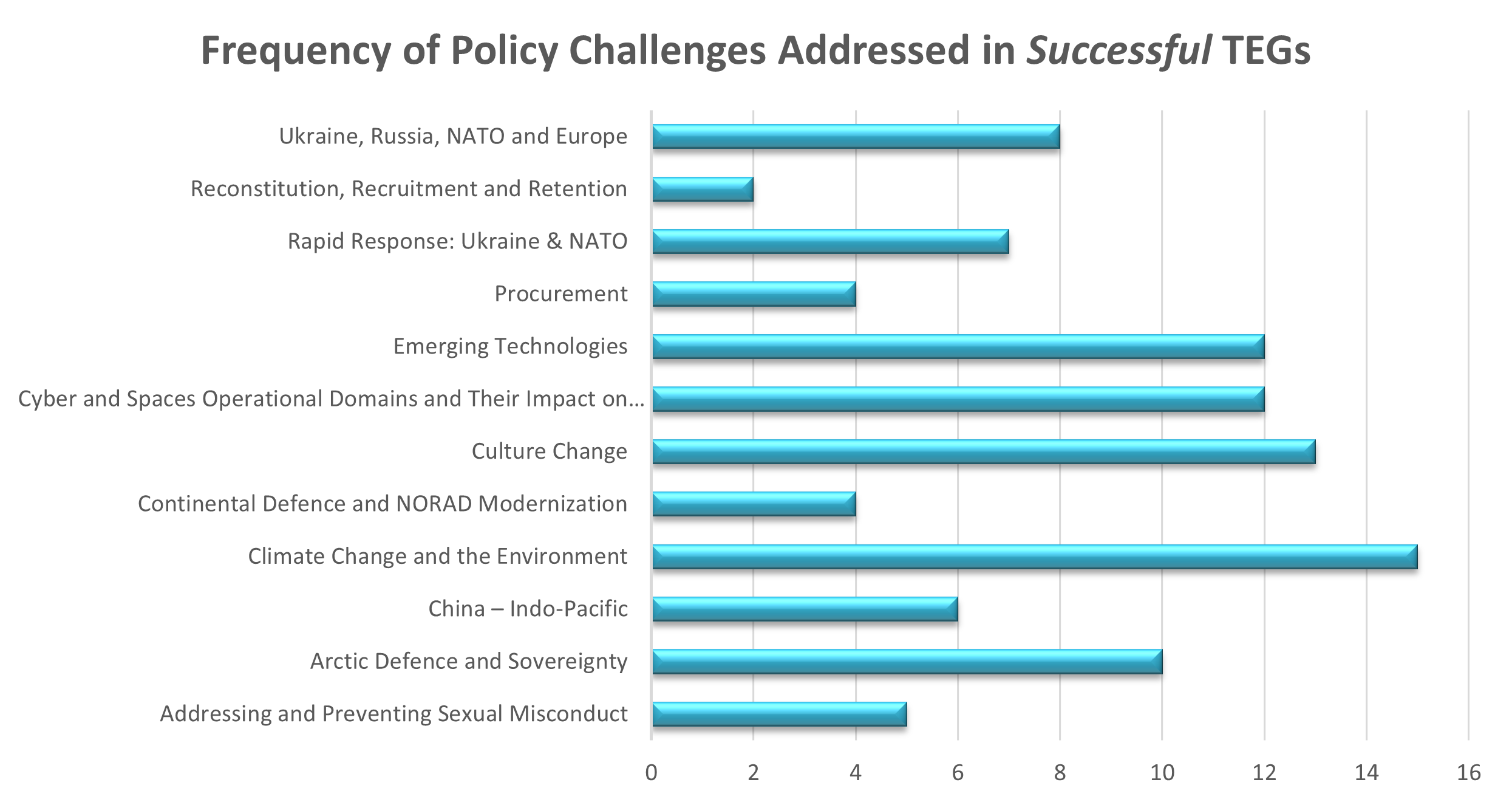
Caption
The second bar chart indicates the frequency of policy challenges in successful TEGs:
- Ukraine, Russia, NATO and Europe: 8
- Reconstitution, Recruitment and Retention: 2
- Rapid Response: Ukraine & NATO: 7
- Procurement: 4
- Emerging Technologies: 12
- Cyber and Spaces Operational Domains and Their Impact on Information Environment: 12
- Culture Change: 13
- Continental Defence and NORAD Modernization: 4
- Climate Change and the Environment: 15
- China – Indo-Pacific: 6
- Arctic Defence and Sovereignty: 10
- Addressing and Preventing Sexual Misconduct: 5
D – Collaborative Networks
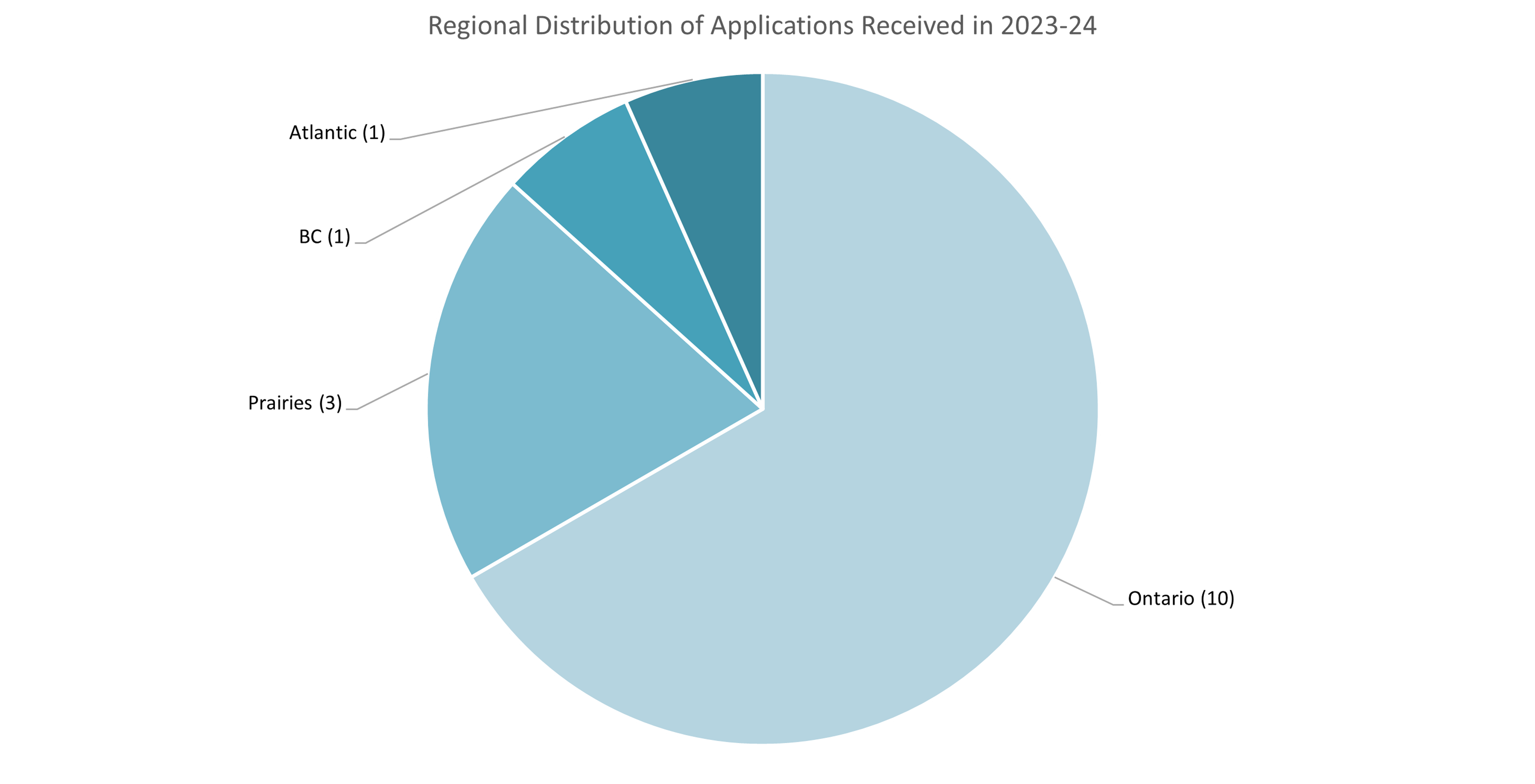
Caption
A pie chart showing the regional distribution of applications received in Fiscal Year 2023-24:
- Atlantic: 1
- British Columbia: 1
- Prairies: 3
- Ontario: 10
MINDS Collaborative Networks bring together multi-disciplinary teams of distinguished experts, from across Canada and abroad. Each Network receives up to $750,000 over three years to enable more sustained collaboration and supports DND/CAF through advanced research and activities.
A call for applications was launched in December 2022 and received 15 applications.
After a rigorous evaluation process, the three new Collaborative Networks selected for 2023-24 were:
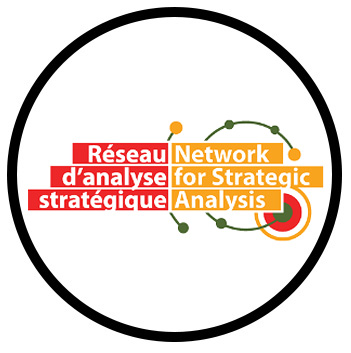
The Network for Strategic Analysis
Queen’s University (Ontario)
A returning bilingual Network, the Network for Strategic Analysis will build on their previous work while continuing to shape their research hub with a renewed focus on the challenges posed by great power competition and climate disruption, the response to these critical challenges, and addressing how Canada can position itself to face these challenges.
Co-Directors: Dr. Stéphanie Martel & Dr. Justin Massie

The Space Security Network
University of British Columbia (BC)
The Space Security Network will bring together space security experts from academia, Canadian and international industry, non-government organizations, and government officials to examine the security, policy, and legal implications of the fast-growing involvement of private space actors in armed conflict.
Co-Directors: Dr. Aaron Boley & Dr. Michael Byers

Triple Helix
Canadian Global Affairs Institute (Alberta)
The Triple Helix is an academic-policy-industry partnership that will explore how a range of emerging technologies intersect with defence. Triple Helix will link developments in emerging technologies to Canadian defence policy and strategy and develop relationships with researchers, practitioners, and industry.
Co-Directors:Dr. Dave Perry, Dr. Alex Wilner, & Michael Petric
Highlights
More information on all our Networks can be found at: Collaborative Networks - Canada.ca
MINDS Collaborative Networks continued to engage with the Canadian media through interviews, Op-Eds and appearances on major news shows from the CBC and Radio Canada, the Globe and Mail, and City News, amongst others. In 2023-24 MINDS Networks produced 100+ additional publications than in the previous year. Some of these publications include scholarly articles, books and book chapters, policy briefs, and research reports. Networks also continue to host and present at a variety of conferences and symposiums, organize workshops, provide relevant briefings, and produce multimedia products such as podcasts and infographics.
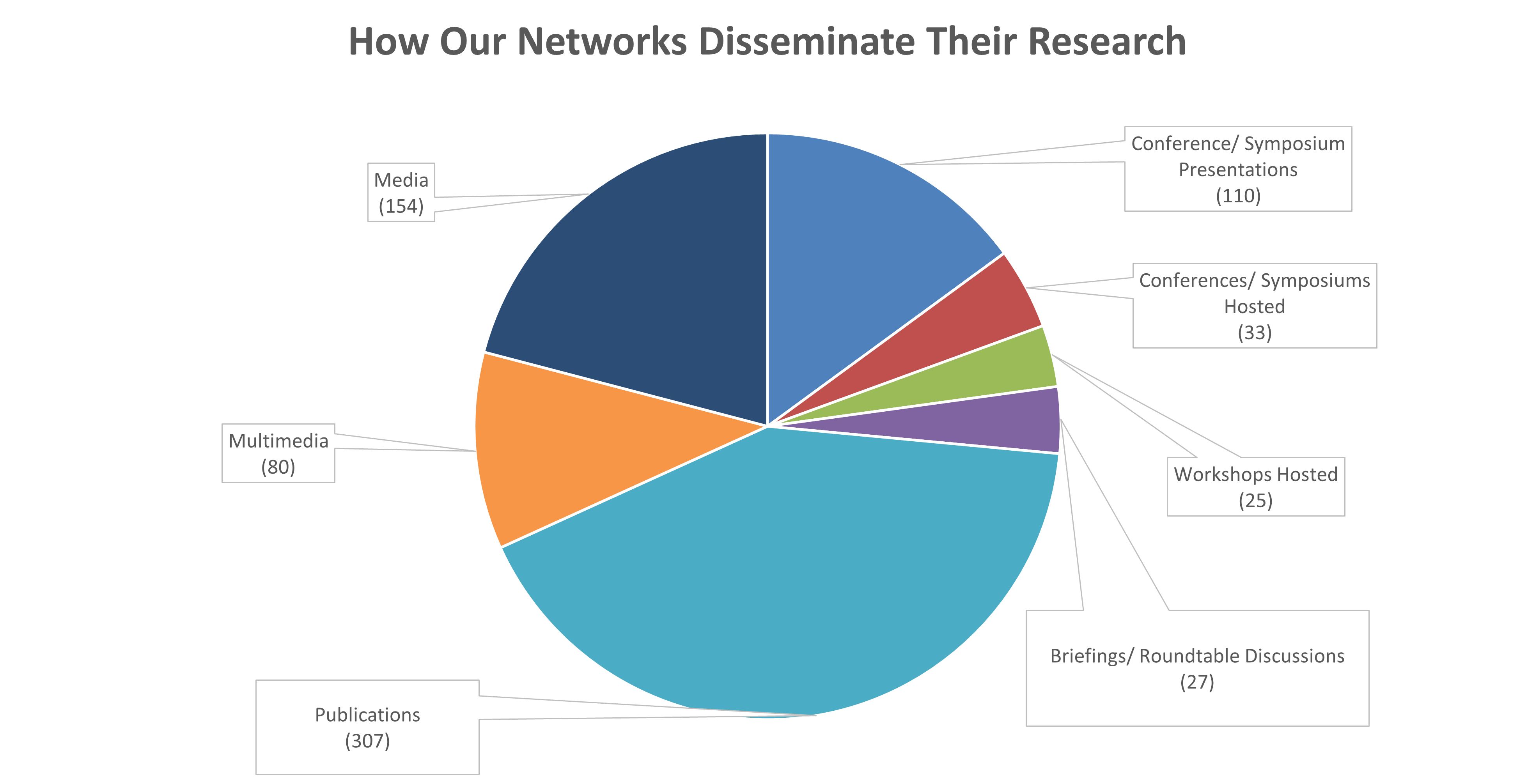
Caption
A pie chart titled: “How our networks disseminate their research”:
- Media: 154
- Conference/symposium presentations: 110
- Conferences/symposiums hosted: 33
- Workshops hosted: 25
- Briefings/roundtable discussions: 27
- Publications: 307
- Multimedia: 80
Highlights from our Existing Networks

Canadian Defence and Security Network (CDSN)
Carleton University
- Organized ‘Meeting of the MINDS’ for all Collaborative Networks
- Hosted their flagship ‘Summer Institute’
- Presented findings from the ‘Climate Security and NATO: Lessons Learned’ field trip to the Defence Team
Director: Dr. Stephen Saideman
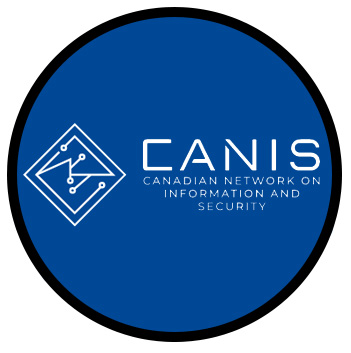
Canadian Network on Information and Security (CANIS)
University of Calgary
- Hosted their 2nd Hackathon on Foreign Interference and Data Visualization
- Employed 9 student Research Assistants
- Organized their annual conference with 11 international experts participating
Co-Directors: Dr. Jean-Christophe Boucher, & Dr. Erin Gibbs Van Brunchot
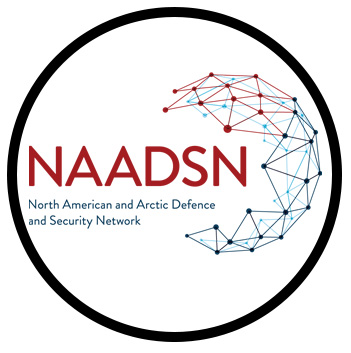
North American and Arctic Defence and Security Network (NAADSN)
Trent University
- Co-Hosted the Norway-Canada Gauntlet Seminar with the Norwegian Embassy in Ottawa
- Co-Hosted the ‘Young Leaders Summit on Northern Climate Change’ with Ecology North
- Members were featured regularly in news outlets such as CBC, Global News, and City News
Directors: Dr. Whitney Lackenbauer

Research Network on Women, Peace and Security (RN-WPS)
McGill University
- Hosted a Research Practice Exchange on Cybersecurity, COVID, and Conflict in Yemen
- Launched the ‘Arbour Report Card’
- Provided feedback on the C-NAP3 to the Office of the Ambassador for WPS
Co-Director: Dr. Jennifer Welsh, Dr. Yolande Bouka, & Dr. Erin Baines
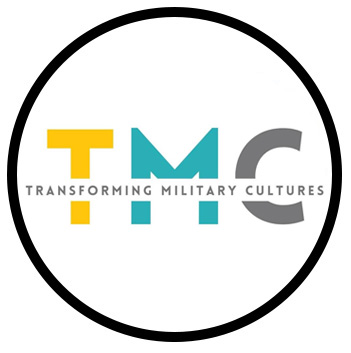
Transforming Military Cultures Network (TMC-Net)
Mount Saint Vincent University
- Hosted their annual Symposium
- Organized webinars on ‘Indigenous People in the Military’ and ‘Culture Change in the Armed Forces and Adult Education’
- Awarded Research Scholarships to four new recipients
Co-Directors: Dr. Maya Eichler, Dr. Nancy Taber, & Dr. Tammy George

Canadian Military Sexual Trauma Collaborative Network (MST-Net)
McMaster University
- Initiated MST Community of Practice
- Continued the B.E.S.T. (Believe Empower Support Together) workshops for trauma-informed leadership within CAF
- Welcomed a new Post-Doctoral Fellow researching military health and wellness
Co-Director: Dr. Margaret McKinnon, & Dr. Andrea Brown
E – Scholarships
MINDS is committed to fostering the next generation of defence and security experts. In 2023-24, the MINDS Scholarship Initiative, administered with the Social Sciences and Humanities Research Council of Canada (SSHRC), and the NATO Defence College (NDC) Fellowship, continued to thrive.
MINDS-SSHRC Joint Scholarship Initiative
MINDS scholarships offer research awards and supplements at the master's, doctoral and postdoctoral levels to students and researchers whose work relates to the MINDS Policy Challenges. The program contributes to the development of a growing, inclusive, and diverse expert community through one-year awards for Indigenous master's students studying defence and security issues.
| Type of Research Training Award | Awards Distributed (#) | Value ($) |
|---|---|---|
| MINDS Doctoral Awards (up to 3 years) | 3 | 105,000 |
| MINDS Doctoral Awards (1 year) | 7 | 245,000 |
| MINDS Scholarship Initiative Supplements (1 year, non-renewable) | 8 | 62,000 |
| MINDS Master's Scholarships Indigenous Students | 1 | 17,500 |
| Total | 19 | 429,500 |
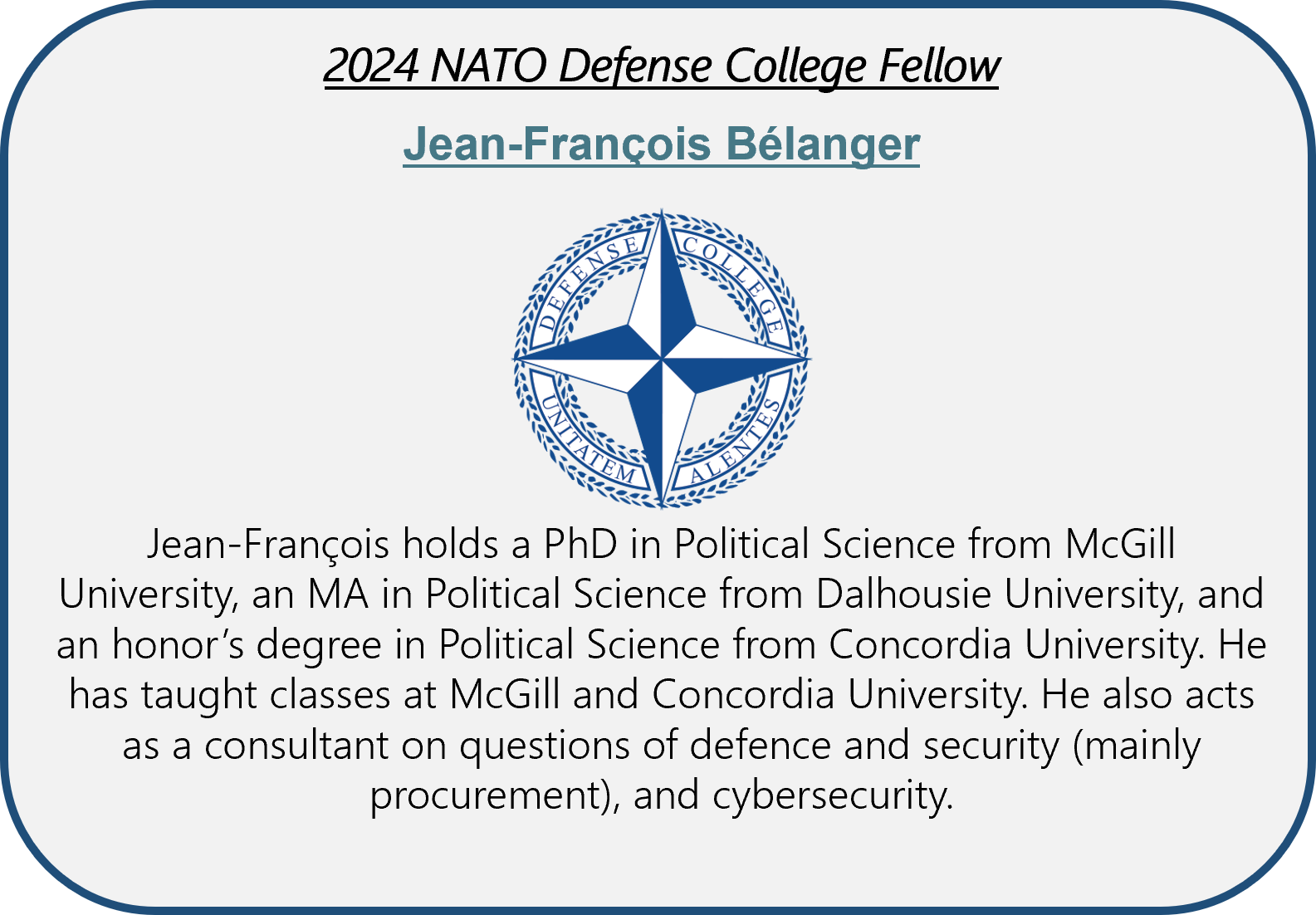
Caption
NATO Defence College Fellowship
The NATO Defense College (NDC) Fellowship provides a unique opportunity for a Canadian researcher to work alongside experts from across allied countries at the NATO Defence College in Rome, Italy. The Fellowship contributes to Canada's commitment to NATO, and helps advance both Canada and the Alliance's strategic objectives, through forward-looking research and collaboration.
The Year Ahead…
As the MINDS program has hit its five-year mark, it has developed into a mature program in terms of its reach and impact. MINDS has seen continued progress in the level of engagement with its various funding mechanisms. This is marked by receiving a record number of Targeted Engagement Grant (TEG) applications in 2023-24. MINDS will build on the strong foundations established in the last five years to continue providing the Defence Team with relevant and timely advice and to foster the next generation of defence and security experts.
Expanding the MINDS Ecosystem
After five years of sustained outreach, MINDS will focus on further diversifying the perspectives and analysis funded through MINDS by expanding its outreach efforts to institutions in geographic regions that have not traditionally been well represented in MINDS funding. Working to ensure that the Defence Team has access to a diversity of viewpoints from the expert community remains a priority for the MINDS program, and the program will continue to promote funding scholarship and grant funding opportunities for emerging scholars at the undergraduate, graduate, doctoral and post-doctoral levels to support security and defence as a viable field of research.
Supporting Canadians' Understanding of Defence and Security Issues
To advance its commitment to contributing to the Canadian public's understanding of defence and security issues, MINDS will continue to support projects that focus on engaging the Canadian public. MINDS funded projects increasingly use social media to engage with the broader public. For example, in 2023-24, 82% of all funded projects included plans to disseminate research results using social media which represents a considerable increase from the 39% in the previous fiscal year. MINDS will continue to support and encourage funding recipients to make their research findings accessible for a broad range of Canadians.
Measuring Success
In 2024-25, MINDS will continue to refine its internal performance metrics to ensure that the program is delivering on its mandate. Performance metrics will be refined to support an assessment of the program's success in fostering meaningful dialogue between the external expert community and the Defence Team, helping foster the next generation of Canadian scholars in defence and security-related issues, and contributing to the Canadian public's understanding of defence and security issues.
Stay in Touch
Follow. Share. Apply
Annex A: List of Expert Briefing Series
People, Culture and Diversity:
- Culture Change, Rapid Trust, and Character-Based Leadership
- Engaging with Affected Communities: A Trauma-Informed Approach
- Understanding the Violent Extremism Nexus: Its Role and Impact on DND/CAF
Readiness:
- Industrial Capacity: Meeting Present and Future Challenges
Continental Defence
- Integrated Air and Missile Defence
- Canada's Emergency Preparedness and Response
Strategic Competition and Global Issues
- China's Grand Strategy: Implications for Indo-Pacific Countries and Canada (two briefings)
- Haïti : Défis actuels et solutions durables
- Beyond 2%: NATO Partners, Institutions & Burden Management
- Insecurity in the Sahel
- The Future of Peacekeeping in Africa
- NATO and Indo-Pacific
Domains and Technology
- The Fight for the World's Most Critical Technology
- Countering Russian and Chinese Cyber and Cognitive Warfare


